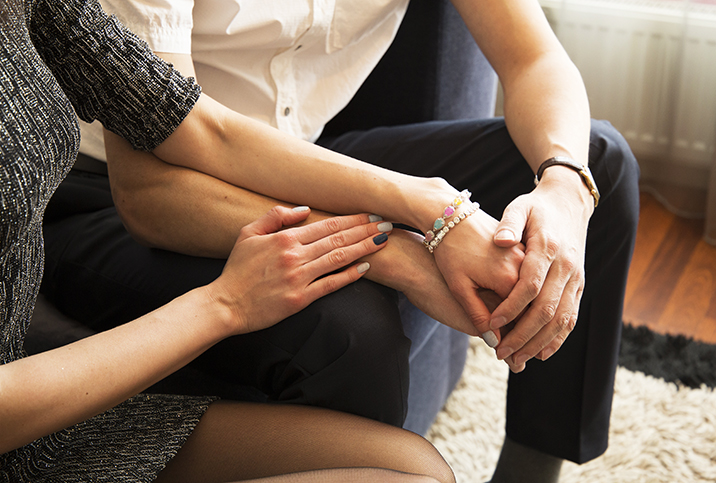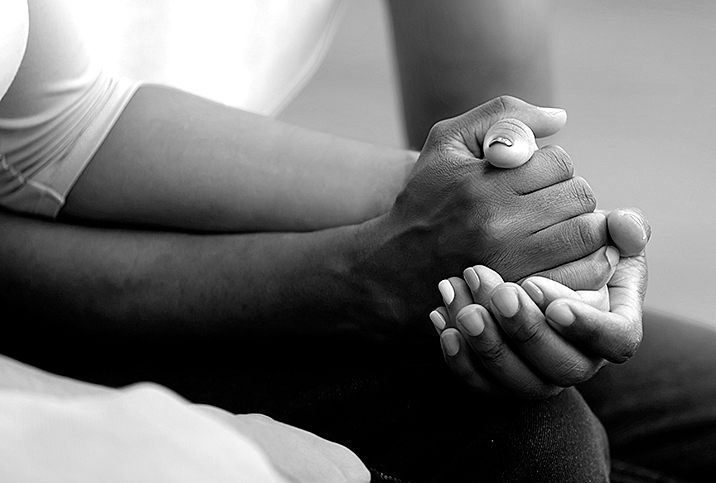It's Better With a Partner: Couples Counseling for ED

Brian Martin saw sex therapist Sara Sloan for a couple of months for his erectile dysfunction (ED). Martin's wife didn't want to join him. However, Sloan eventually told them she thought couples therapy would be helpful.
"She was getting her feelings hurt every time he had an ED episode," said Sloan, a licensed marriage and family therapist at Austin Concierge Therapy in Austin, Texas. "She thought she wasn't attractive, or maybe he likes girls who look different than her. There was a lot of insecurity around it."
When Sloan brought them in for couples therapy, she gave them a psychoeducation—an intervention where the therapist provides information so the couple can better understand and cope with the dysfunction. The couple discussed the ED situation, and Sloan saw them another two or three times after that.
'Sex is so much more than just physical intimacy.'
"Once the pressure was taken off the erection, he had no problem," Sloan said. "It was really working with her that took the pressure off of him. We can work individually on taking the pressure off of himself, but a lot of the pressure was coming from his partner."
Martin (a pseudonym) is a success story of couples therapy working for a man with erectile dysfunction. Men who are married or in a relationship and have ED that's caused by relationship problems or psychological factors, rather than a physical issue, may benefit from this form of psychotherapy.
When men come to Sloan with ED issues, she usually asks them if they are open to having a session with their partner because ED is often influenced by both parties, especially if it's been going on for a while.
"What I always like to say is the weight of the relationship often is put onto the penis," Sloan said. "If you've got that much weight on something, it's not going to work. It's not going to be able to go up."
How can couples therapy help men with ED?
Attachment is an important part of any romantic relationship.
"You want to be able to securely attach to your partner," Sloan said. "A lot of times when there's sexual dysfunction, you want to take a look at the attachment first."
After asking clients with ED a series of questions to rule out any physical issues, Sloan moves on to the mental and emotional aspects.
"If there are mental and emotional issues, a lot of times it centers around the attachment itself," she said.
Couples therapy allows the couple to identify when the ED started happening and how it impacts both parties, said Jenn Bossio, Ph.D., a sex therapist, psychologist and owner of Tri Health Clinic in Kingston, Ontario.
"Sex is so much more than just physical intimacy," Bossio said. "Sex doesn't just exist in the bedroom. It exists in many of the interactions between partners."
It can be easy for busy couples to not prioritize intimacy, she said.
"By strengthening the relationship, ultimately what we're doing is we're strengthening that relationship overall, which then plays out in the bedroom," Bossio said.
Creating a safe environment
Couples therapy can create a safe environment for difficult conversations and help each partner empathize with the other, Bossio said.
"If I am feeling constantly hurt by my husband, and then he starts having erectile dysfunction, I'm not going to come to him with extreme empathy and say, 'Okay, let's figure this out together,'" she said. "I'm going to be like, 'F you, figure this out on your own. What happened? You're not attracted to me anymore?'"
Counseling can help the couple explore the issue, making it easier to take the pressure off, and work together, Bossio said. Couples therapy also helps men to not feel alone in dealing with their ED.
"They don't have to carry the burden of this completely by themselves," she said.
Exercises to do at home
An exercise Sloan recommends to clients struggling with ED is to make a sexual menu. A couple can enjoy each other sexually in many ways besides intercourse, she said.
"Even if the penis is flaccid, you can still rub against it. That can be enjoyable. You [have] all kinds of oral sex. There are sensate focus exercises. Really, anything you can come up with," Sloan said.
In other words, anything that brings pleasure can be put on the sexual menu.
"In a way, it gives us a license to be more creative," Sloan said. "What else can we do that is enjoyable and different and still helps us connect?"
Sex is about connection for many people, especially those in relationships, she said.
Misconceptions about couples counseling
A common misconception about couples therapy is that it's only for doomed relationships, Bossio said.
"I would absolutely argue the opposite," she said. "It's the people who care enough about their relationships to want to try to fix it and improve it that end up getting huge benefits. We go to couples therapy because we have good relationships, not because we're doomed."
People should not go into couples therapy expecting the therapist to take their side.
"If you have a therapist who does that, find someone else, because they're doing it wrong," Bossio said. "Couples therapy is meant for the therapist to act as a translator or a teacher to help the couple understand these vicious cycles that they get into. It has absolutely nothing to do with seeking judgment as to who's right and who's wrong."
An easier way to treat ED
Sloan said she thinks ED is harder to treat with one-on-one therapy than it is with couples therapy.
"I find it much easier to treat in relationships," she said. "You want to see if you can find someone who's both a couples and a sex therapist with ED, because I don't think you can do one without the other."
A therapist needs to figure out what's going on in the relationship and address it. Sloan pointed out that sometimes ED will crop up when partners have been fighting.
"If the couple has lost their connection, or if there's been a long sexless period, ED can also occur because of the pressure that builds up," she said. "Like, 'Oh my gosh, this [encounter] is my only chance. It's been my only chance in the last six months to make it work.' And then, of course, it doesn't work because of the pressure."
Sloan finds that with a lot of couples, whenever ED occurs and one partner feels like it's their fault, both partners shut down.
"You want to make it clear that it's nobody's fault," she said.


















